|
Ocean Falls Museum
-
Personal Recollections
Leif Knutsen -
Resident ('66-'70)
I live in New Jersey, although my
background is in Norway, where I was born, where my parents live, and
whose passport I still hold.
I lived in Ocean Falls from 1966 to 1970, corresponding to the ages of 5
through 9. I have vivid recollections from my time there and am dreaming
of sometime visiting. I believe living in Ocean Falls was a formative
experience for me - among other things, it taught me the value of
diversity and the importance of community. I don't think I would have
dreamed of moving to a place like Ocean Falls now, but that makes me
appreciate the experience even more.
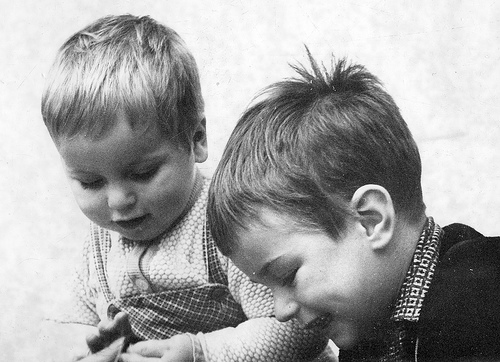
Eyolf and Leif
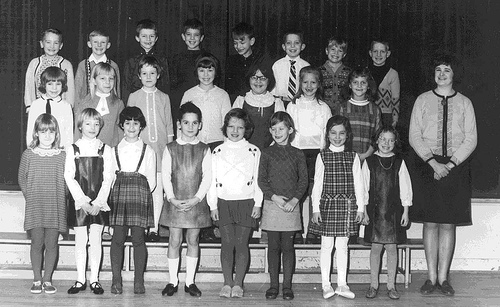
The Teacher is Miss Hoon
Back:
Ray(?), Robert Wilde, me (Leif Knutsen), Clifford (?), Teddy, Sigmund,
Peter, Alan.
Middle: Lucy, Janet, Anita, Susan, Cindy, Mary (then Elizabeth) Potyrala,
Kathy.
Front: Sophie(?), Julie Petersen, Rita Strebel, Tracy
Tiemens, Lucy, Patty, Teresa, Unknown
You have to start
with the little town's setting. Its location has nothing to do with
convenience for the townspeople, but only with hydroelectric power and
lumber flotation. The name of the town gives it all away: Ocean Falls.
It's built next to a waterfall from a lake straight into Cousins Inlet,
a branch of the Pacific Ocean on British Columbia's central coast.
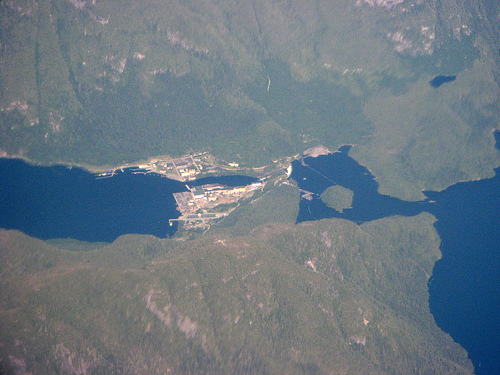
The town is
perfectly situated for a pulp and paper mill but not much else. Huge
mountains of either side hover oppressively over either side of the
falls, and there really isn't enough flatness for much of anything
people would ordinarily build. Add to that the greatest annual rainfall
anywhere in Canada, and the proposition should give cause to anyone but
very dedicated back to nature types.
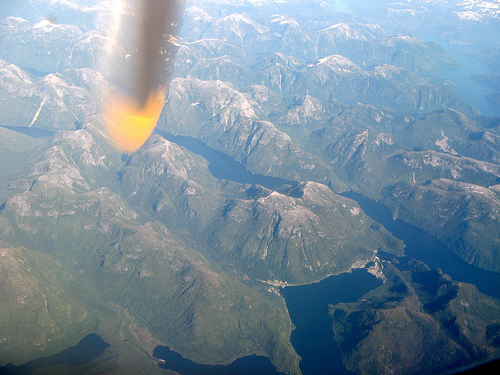
The town was
built, operated, and governed by the mill. There were no local
elections. The two most powerful people in town were both loyal company
men: the townsite manager, who ran everything on the side of the falls
where people lived, and the mill manager, who ran everything on the mill
side of the falls.
The two sides were
linked by a bridge, over which only employees were allowed to cross,
coming or going. There were housewives who lived in Ocean Falls for
decades without ever seeing the mill side.

The townsite had a
few flat areas, where the oldest and arguably nicest houses were built.
Front street faced the falls, dry by virtue of the power plant. The
street quickly turned into a steepening hill that followed the falls up
to the lake. Alongside the road there were built some modern apartment
buildings, a decidedly 40's movie theater, and the ugliest recreation
center you ever saw.

But for their lack
of aesthetic appeal, these buildings were of central importance for the
people in town. The swimming pool in the recreation center was the venue
for a swim team that had brought international fame to the town, and the
theater was the gathering place for all children Saturday mornings. Kids
generally had two scheduled extracurricular events - swimming and the
movies.
In the other
direction Front Street led past the only bank in town to what an
imaginative mind might dub the town plaza. This was the bridge landing,
perpendicular to the entrance to the general store. Really it was the
dock for Ocean Falls's main lifeline to the outside world, the
"Northland Prince," a freighter with a few passenger cabins that went up
the coast and back every week.
A pretty little
park in front of the townsite office covered the other side of this
imaginary plaza. On a rainy dark afternoon you'd see women struggling
with brown grocery bags that were disintegrating from the rain. No one
really complained - it was how we lived.
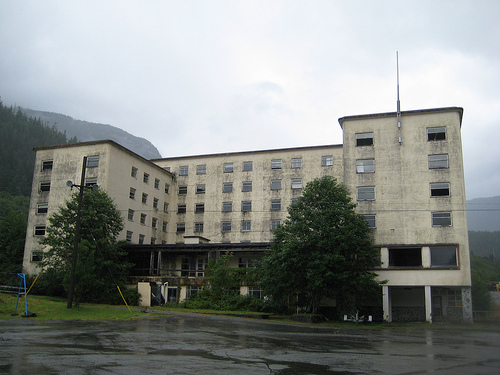
On one corner
stood the hotel, called Martin Inn. It was supposed to be the third
largest hotel in B.C., but was really a dormitory for single mill
workers on a short-term stay. The mill would also put families up there
until their company-assigned homes were ready for them. Many of us kids
had memories of the cafeteria food, the hallways, and the lobby of
Martin Inn as our first impression of Ocean Falls.
The bridge pointed
up to the side of Caro Marion, the highest and I always thought most
ominous mountain surrounding Ocean Falls. For one thing, you couldn't
even see the top from the townsite, it was that steep. But the mountain
had its name from two children, Caro and Marion, who had wandered off
onto the mountain and were never recovered. Their memories were
enshrined in empty caskets and buried. Although the story seemed a
little implausible to me - the woods were nearly impassable and downhill
would inevitably lead to the shore, it served as a deterrent to us all -
you stay on the townsite.
This central
street also culminated in a hill that stopped at the forest's edge. On
the right side was the Charleston school, a no- frills K-12 offering one
could sense the province had set up only reluctantly, the town having
only 2000 residents.
A road went by the
front of the school cast in concrete only for a short while before it
became the most prominent of Ocean Falls's wooden roads, structures that
looked more like scaffolding than permanent thoroughfares. These wooden
roads provided precarious access to houses that were built in a spirit
of audacity on outcroppings of the cliffs that surrounded Ocean Falls.
The wooden roads were crude but solid and apparently impregnated very
well. Still they were slippery when wet, and they were usually wet.
Steep, slippery and curvy roads, combined with the smallness of it all,
made owning a car a ridiculous proposition, but a few did anyway. A gas
station opened a few hours once a week to accommodate these motorists,
who, I can only speculate, were driven to their purchase by a fervent
need to live more like the vast majority of increasingly affluent
Canadians.
Going back to what
we're illustratively considering our plaza, another mostly wooden road
fronted a surprisingly vast marina on one side and federal buildings on
the other. Here was the post office, the RCMP station, the Legion, and
the customs office. At the end of this "federal strip" was the liquor
store, open twice a week and strictly off limits to minors.
I lived in the row
of houses on the bluff behind the federal buildings. These were
three-bedroom houses with a front- and backyard. The hospital, an old
large building that would like a residence anywhere else, was on the
edge of the bluff. The hospital and our row were separated by a nice
walkway and a lawn with trees. I always thought it was one of the
prettiest places in town. Our next door neighbor was the one physician
in town, who - I would have to guess - became a general practitioner per
excellence.
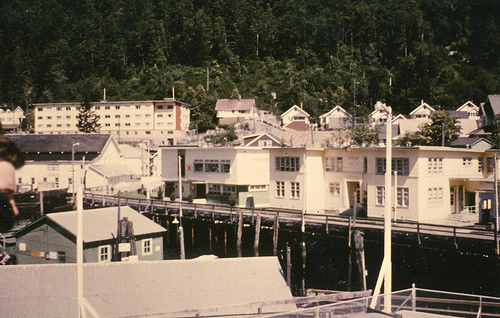
More houses had
been built along the shore toward the inlet's outlet, as it were. Along
the edge of the forest, just where it became too steep for anything,
another wooden road led to a dead end that seemed almost like a
frontier. Once I saw a little boy lose control over his tricycle down
that hill. He went past me with a calm expression and went right off an
unprotected edge in the road, into a pile of rocks. It was a beautiful
day, and all this happened without a sound. I literally couldn't believe
my eyes - the boy had vanished without a trace and without a sound. It
seemed like minutes but couldn't have been more than seconds before his
mother appeared and pulled him out, bleeding and presently screaming.
Along the
shoreline the marina continued, and the road actually went out of town,
ending up in a suburb of sorts, known as Martin Valley. Here some people
who had come to love their peculiar life in Ocean Falls, built their own
houses in a beautiful scenery. At Martin Valley, it ended. Many years
ago, a brothel stood on an outcropping beyond, but it had burned down.
And this was what
Ocean Falls was all about - a place remote from the rest of the world.
The only way in or out was by seaplane or boat. The isolation was
profound even if it wasn't absolute. People would take vacations on the
outside, but a surprising number didn't.
I have to think
that were many reasons why people chose to come to Ocean Falls, but only
a few why they stayed,. My father was moved by the mill's holding
company in and out of the town, so we knew our stay was temporary. I
remember the night our next door neighbors left. They celebrated through
the night, culminating with the husband standing in the middle of the
street, yelling at the top of his lungs "F*** YOU OCEAN FALLS!". Even as
children we were thrilled to be leaving, to try our wits in the real
world. To us, a town with a drive-in restaurant was a metropolis.
The climate and the isolation seem
difficult to even contemplate now, but our lives there were placid and
filled with the small things that take up most people's lives. There
were a few tragedies that swept through the town, slowing it down for a
while in communal grief. A boy drowned in the swimming pool, trying to
swim laps underwater; a young man fell off a cliff he was climbing with
a deer on his back. Friends of my parents lost an infant to SIDS. People
were buried in the little cemetery in Martin Valley; dying in a place
that everyone thought was a temporary place.
The shared
hardship of life in Ocean Falls created community and trivialized class
distinctions. Status may have determined what kind of quarters the
townsite assigned to you, bit few cared much. Certainly children didn't.
To me life in
Ocean Falls provided an object lesson in doing the best with what you
had. There were small scout, brownie and boy cub troops, a judo club,
swimming of course, a small library. There was TV programming only a few
hours a day, and it consisted of selected shows taped and rebroadcast
locally. The mountains and distance got in the way of regular reception.
Outdoor life
wasn't as abundant as you might think, either. Quite a few people went
fishing, and I dare say that leisure boats outnumbered cars by an order
of magnitude. A few people went hunting, and there was even a little
skiing. But all this took some determination. It simply rained too much.
I remember the school fire quite well. I believe
I was 8 years old at the time, and we lived in the house right next to
the doctor's (I can't recall whether the doctor was Ian Taylor or Tom
McQueen at the time), so we had a view to the school from our kitchen,
across the playground.
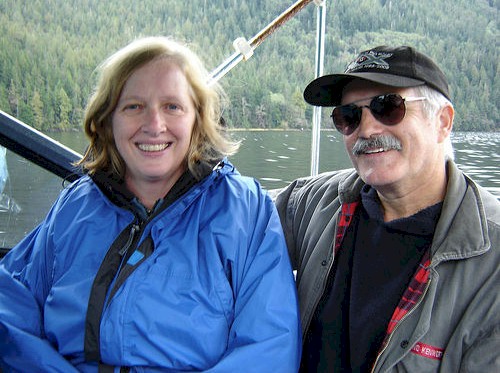
I remember that I woke up one night and
noticed my parents were in the kitchen, talking softly with each other.
I asked them what was going on, and they said that the school was on
fire, but that they would probably extinguish it. Now, there had been
another fire recently that had been extinguished quickly, so we figured
this one wouldn't amount to much either. But more and more smoke
developed, and people around the school got more and more hurried. Since
we lived right next to the hospital, we heard that one or two firemen
were admitted with smoke inhalation problems. It seemed that efforts to
stop the fire were utterly frustrated, though to this day I don't know
why. From our vantage point, I couldn't get much of a sense where the
fire was or what was being done about it - we saw some smoke and
activity, but no flames in the beginning. I believe my father went out a
couple of times to find out what was going on - he wanted to offer to
help retrieve things out of the buildings if help was needed. It became
apparent to me after a while that they were unable to control the fire,
and before long, we saw some flames in the high school. After some time,
the school was ablaze in what looked to me to be a tornado of a giant
flame, with a deafening roar. We were wondering what would happen if
houses started burning; whether the whole town was in danger. I started
wondering where we'd go if that happened. My parents said they thought
we could have gone to one of the Norwegian freight boats that were
docked in Ocean Falls at the time - the Rondeggen or Beseggen.
For a while we thought that the fire would be limited to the high
school, but then the roof of the elementary school caught fire. I
remembered that I had left a pair of slippers and two books ("History of
the World for Young Readers" and "World Geography for Young Readers") in
my desk there.
A fireman was brought to the hospital with smoke poisoning. It wasn't long
before we saw more and larger flames, and some of them jumped over to
the roof of the elementary school, which was a tar roof.
Soon the entire school was like a fireball - it was roaring like a mad
animal, and we felt the heat through the kitchen window, which seemed to
buckle. I was at once exhilarated and terrified of it - my parents
reassured me that the entire town could be evacuated to the mill side if
necessary, and that we were good friends with the captain of the
Norwegian boat that was docked at the mill. I think we were all worried
that the whole town - wooden streets and all - would catch fire.
It became clear to us that the firemen had given up on saving the school
and had concentrated on preventing the inferno from spreading. As the
flames started dying down, we went to bed. I wondered what things would
look like in the morning. We had learned that one or two other buildings
had been lost, but that there was no threat to the rest of the town. It
was hard to believe that a place as wet as Ocean Falls could sustain any
kind of fire, but it was pretty violent.
Where the school used to be, there was nothing but twisted metal and
ashes. Over the Christmas break, it snowed, and some friends of mine and
I rummaged through the ruins (which I'm sure we weren't supposed to do).
There was nothing to scavenge, which was pretty unusual - there always
seemed to be something worth scavenging in Ocean Falls.
This happened on the first day of the school's Christmas vacation, and
we walked around the charred remains for days afterwards. It was a
strange atmosphere - I'll never forget the smell.
We were convened in Crown Theatre the day school was supposed to start,
where we were instructed where to show up for school the next day. My
class (Miss Gomez's 3rd grade) was housed in Cascade Lodge, where we had
more space than before. We lost one day of school to the fire, which
must be pretty impressive.
I'll never
forget the smell that lingered in the charred remains of the school for
weeks afterwards.
Among ourselves, we wondered who had the bad judgment to set fire to the
school on the first day of the break, rather than the last one. As it
was, our first day back in school was in the Crown Theatre, where we
were told to show up at Cascade Lodge the next day and were given the
rest of the day off.
Rumor had it that a disgruntled (and slightly insane) teacher set the
fire. This was never confirmed, but it was clear that it had been caused
by arson.
As I remember it, the school did an excellent job of improvising in the
provisional facilities. In fact, I seem to have fonder memories of
classroom life there than in the school itself. We left Ocean Falls that
spring. I remember thinking: I am one of the few people who saw his
school burn down to the ground. To this day, it is one of my most vivid
memories.
I am struck by a
surprising sense of affection among the residents of Ocean Falls. I
think most people were glad to leave Ocean Falls, but few regret having
lived there. |